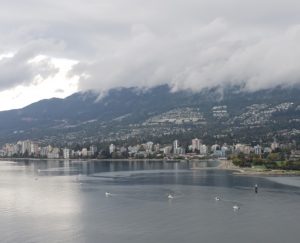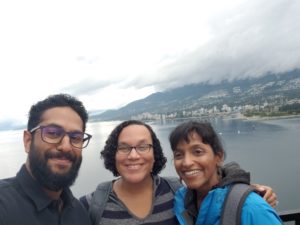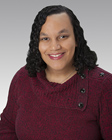By Andrea Hulighan Director, Community Grants Coordinator and Youth Grantmakers in Action, The Winston-Salem Foundation

I don’t know why but it took flying outside of the country to the city of Vancouver in British Columbia, Canada for it to sink in that the PLACES fellowship is so much more than a typical professional development experience. Vancouver was the third city we visited as a group this year and I had a truly transformative experience there. While the people we met and the places we visited were fascinating and thought-provoking, it was the time I spent with my colleagues and in self-reflection that impacted me the most.
This was my first trip to Canada and everyone I talked to who had been to Vancouver told me that I was headed to a beautiful destination. They were right about the landscape; it truly did not disappoint. It was amazing to be in what felt like a large city yet look in one direction and see incredible mountains and then look in another direction and see clear blue water. Yet, this was not the first thing I observed about Vancouver. Instead I noticed right away that as a black female, I stood out. Over the course of four days, I saw fewer than 20 black people, and one of those days included walking approximately six miles in and around the city. (One question we never got answered during our stay is what happened to the black people in Vancouver.) I also noticed that there were hardly any homeless people near where were staying, and it wasn’t until we traveled to a completely different part of the city that it became clear that the homeless population is very much concentrated and essentially hidden away from popular tourist spots.
Because of my experience with PLACES, I know that the way our cities and towns look is in no way magical and I immediately began to wonder what systems, policies, and historical events led to the Vancouver I was seeing. This is what PLACES does—it makes me question everything and want to understand why the places we visit and the place I live are the way they are. We met with several representatives from local nonprofits, foundations, as well as community organizers who shared their experiences and helped us learn more about Vancouver. We met some incredible people working hard to expose and fight against both historical and current policies that have marginalized people of color who are living in Vancouver.
Each person we met started their introduction with by sharing that the land we were on was unceded and then named the specific groups of indigenous people who to this day have not surrendered the land. This was powerful to hear and made me wonder what it would be like to give acknowledgements in my city of Winston-Salem, North Carolina. What if we started each meeting acknowledging the Native Americans who called this home long before the first Moravians came here and took over their land, and then acknowledged the enslaved Africans who endured horrendous atrocities just to live so that the white people could thrive? How would this change the course of our meetings and influence our conversations and actions? Could we ever be bold enough and honest enough to do this? I do not know the answers to these questions yet, but again, this is what PLACES does—it makes me question everything and think about how I can disrupt a culture that has been dominated by white norms since our country’s inception.
It’s these types of questions that have made my PLACES experience truly transformative. When we are spending time alone as a cohort during our visits, we talk about racial equity specific to our work in philanthropy and ask tough questions such as what assets are we withholding in philanthropy that are not ours to withhold, knowing how much of the wealth in this country has been obtained by oppressing certain groups of people, specifically people of color. These questions are hard to answer and honestly at times have been painful to hear as a person of color, but I have learned that we cannot do this work of social justice and racial equity without asking these types of challenging questions and trying to find the answers.
It was this trip that also made me realize how important it is for me to bridge what I learn and experience with my PLACES cohort to what I do at my foundation. Bina Patel, our incredible PLACES consultant, has been telling us this since our first visit to Wichita, but it took this trip to Vancouver for me to finally feel the weight of responsibility of becoming the change agent Bina has challenged us to be in our various foundations. One way I have started to do this is by sharing my experiences with my colleagues of color and asking them the questions that I continue to struggle with so that we can work through them together. I also recently wrote a statement about our commitment to racial equity as an organization that has officially been adopted by my foundation. I would have never had the confidence to create this statement, let alone known what to write, without my PLACES experience. I have been thinking through what I need to do next to make sure that what I have learned helps to challenge us as a foundation to infuse racial equity in all that we do.

One poignant moment in Vancouver that I will always carry with me was from our last full day together when we visited the Dr. Sun Yat-Sen Classical Chinese Garden. There we met with Vanessa Richards with Creative Together. Vanessa helped us tap into our creativity through a variety of activities, including singing. I have to admit that when I saw there was singing on the agenda I cringed because I knew it would take me out of my comfort zone, but that is what racial equity work is about—getting out of your comfort zone and thinking creatively about how to interrupt the systems governed by white norms that we operate in on a daily basis. It ended up being a powerful exercise where we all were standing in a small space outside surrounded by the beauty of the gardens with no sounds other than our voices singing repetitious songs with only three or so lines that held immense meaning. It was a surreal moment, and at one point I took the time to look at the people surrounding me and felt this huge sense of gratitude for the role each of them have played in helping me grow, not just professionally, but as a human being this year. I will be forever grateful to my PLACES cohort and to Vancouver for what I experienced in a city surrounded by beauty that internally is struggling (just like we are here in the states) with defining what a truly racially equitable society would look like and how to get there.
Catch up on our last GOING PLACES blog here.
About the Author
 Andrea Hulighan is a 2018 TFN PLACES Fellow and is the director of Community Grants at The Winston-Salem Foundation. She also leads the Foundation’s youth philanthropy initiative. Prior to joining the Foundation in 2007, Andrea was a program manager with Today’s Students, Tomorrow’s Teachers, a national career development program for minority high school students interested in becoming teachers.
Andrea Hulighan is a 2018 TFN PLACES Fellow and is the director of Community Grants at The Winston-Salem Foundation. She also leads the Foundation’s youth philanthropy initiative. Prior to joining the Foundation in 2007, Andrea was a program manager with Today’s Students, Tomorrow’s Teachers, a national career development program for minority high school students interested in becoming teachers.
